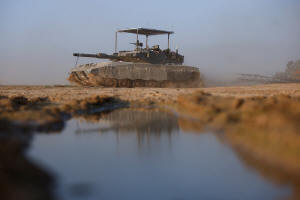Israel launches storm of Khan Younis in southern Gaza, hospitals overrun
 Send a link to a friend
Send a link to a friend
 [December 05, 2023]
By Bassam Massoud and Ibraheem Abu Mustafa [December 05, 2023]
By Bassam Massoud and Ibraheem Abu Mustafa
GAZA (Reuters) -Israeli forces launched their long-awaited storm of the
main city in the southern Gaza Strip on Tuesday, where hospitals were
overrun with scores of Palestinian dead and wounded.
In what appeared to be the biggest ground assault since a truce
collapsed last week, residents said Israeli tanks had entered the
eastern parts of Khan Younis for the first time, crossing from the
Israeli border fence and advancing west.
Some took up positions inside the town of Bani Suhaila on Khan Younis'
eastern outskirts, while others continued further and were stationed on
the edge of a Qatari-funded housing development called Hamad City,
residents said.
After days of ordering residents to flee the area, Israeli forces
dropped new leaflets on Tuesday with instructions to stay inside
shelters during the assault.
"In the coming hours, the IDF (Israel Defence Forces) will begin
launching an intensive attack on your area of residence to destroy the
terrorist organization Hamas," said the leaflets, addressed to residents
of six eastern and northern districts, amounting to around a quarter of
Khan Younis.
"Donít move out yet. For your safety, stay in the shelters and the
hospitals where you are. Donít get out. Going out is dangerous. You have
been warned.Ē
The Israelis, who seized the northern half of Gaza last month before
pausing for the week-long truce, say they are now extending their ground
campaign to the rest of the enclave as they try to annihilate its Hamas
rulers.

"We're moving ahead with the second stage now. A second stage that is
going to be difficult militarily," government spokesperson Eylon Levy
said.
Israel is open to "constructive feedback" on reducing harm to civilians
as long as the advice is consistent with its aim of destroying Hamas, he
said.
CHILDREN'S BODIES ON THE FLOOR
At Khan Younis' main Nasser hospital, the wounded arrived by ambulance,
car, flatbed truck and donkey cart after what survivors described as a
strike on a school being used as a shelter for the displaced.
Inside a ward, almost every inch of floor space was taken up by the
wounded, medics hurrying from patient to patient while relatives wailed.
A doctor carried the small limp body of a dead boy in a track suit and
placed him in a corner, arms splayed across the blood-smeared tile. On
the floor next to him, surrounded by discarded bandages and rubber
gloves, lay a wounded boy and girl, their limbs tangled with the stands
holding the IV drips in their arms.
Two young girls were being treated, still covered in dust from the
collapse of the house that had buried their family.
"My parents are under the rubble," sobbed one. "I want my mum, I want my
mum, I want my family."
Outside, men carried corpses in white and bloodied shrouds to be taken
away for funerals. Around a dozen bodies lay on the ground. Five or six
were taken away in a motorcycle cart.
Aisha al-Raqb, a 70-year-old woman, said her son Iyad was among the dead
and held out a blood-stained hand.

[to top of second column]
|

An Israeli tank maneuvers near Israel's border with southern Gaza,
amid the ongoing conflict between Israel and the Palestinian
Islamist group Hamas, in Israel, December 4, 2023. REUTERS/Amir
Cohen

"This is his blood. This is his precious blood. May Allah have mercy
on his soul. My darling. I (want to) smell his scent, smell his
scent, oh God, oh God," she said.
Gaza health ministry spokesperson Ashra al-Qidra said at least 43
corpses had already reached Nasser hospital that morning.
"Hospitals in the southern Gaza Strip are totally collapsing, they
cannot deal with the quantity and quality of injuries that arrive at
the hospitals," he said.
WASHINGTON URGES LESS HARM TO CIVILIANS
Washington has urged close ally Israel to do more to reduce harm to
civilians in the next phase of the Gaza war, which Israel launched
in retribution for an Oct. 7 attack by Hamas fighters who rampaged
through Israeli towns, killing 1,200 people and seizing 240
hostages, according to Israel's tally.
Israel's bombardment has driven 80% of Gaza's 2.3 million residents
from their homes, most fleeing south. The enclave is more densely
populated than London, and crowded southern areas are now sheltering
triple their usual population.
According to Gaza health officials deemed reliable by the United
Nations, more than 15,800 people are confirmed dead, with thousands
more missing and feared buried under rubble.
Israel says blame for harm to civilians falls on Hamas fighters who
operate among them, including from underground tunnels that can be
destroyed only with huge bombs, though Hamas denies doing so.
Since the truce collapsed, Israel has been posting an online map to
tell Gazans which parts of the enclave to evacuate. The eastern
quarter of Khan Younis was marked on it on Monday, and is home to
hundreds of thousands of people, many of whom took flight on foot.

"What civilians should do to stay safe is listen to the instructions
that are coming out from our Twitter accounts, from our website, and
also to look at the leaflets that are landing in their areas,"
Israeli military spokesperson Richard Hecht said.
Gazans say there is no safe place left to go, with remaining towns
and shelters already overwhelmed. Israel has continued to bomb the
areas where it is telling people to go.
"The situation is getting worse by the hour," Richard Peeperkorn,
WHO representative in Gaza, told reporters via video link from
southern Gaza.
(Reporting by Bassam Massoud and Ibrahim Abu Mustafa in Khan Younis,
Gaza; Mohammed Salem and Arafat Barbakh in Rafah, Gaza; Maayan
Lubell, Ari Rabinovich and Emily Rose in Jerusalem; Maggie Fick in
BeirutWriting by Peter Graff, Editing by Timothy Heritage)
[© 2023 Thomson Reuters. All rights
reserved.]This material
may not be published, broadcast, rewritten or redistributed.
Thompson Reuters is solely responsible for this content. |